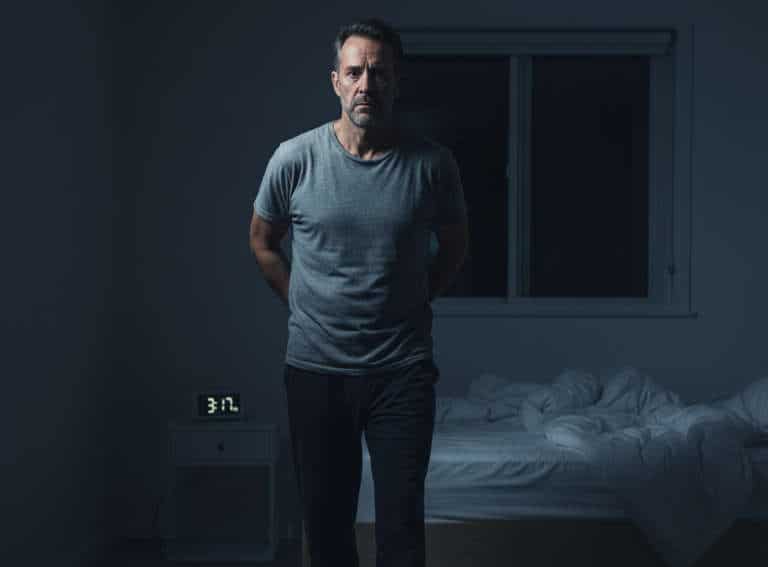Reprogramming the Subconscious for Sleep
For many people, bedtime is the most peaceful time of day. The body softens, the mind unwinds, and sleep feels like a natural release. But for others, the approach of night brings dread rather than comfort. The mind begins to race, the heart quickens, and a fear of lying awake takes hold. Instead of looking forward to rest, the clock becomes an enemy, ticking loudly with every passing minute. For those caught in this cycle, overcoming sleep anxiety becomes the first step towards reclaiming calm nights.
This condition, known clinically as sleep-related anxiety or somniphobia, involves persistent fear about falling asleep, staying asleep, or about what might happen during sleep. Nightmares, loss of control, or even the belief that “I won’t sleep again” can turn the bed into a place of tension. Unlike occasional sleeplessness, this is an entrenched cycle that leaves people exhausted and anxious.
Overcoming sleep anxiety requires more than trying harder to sleep. It means addressing the subconscious patterns that keep the cycle alive. Hypnotherapy is emerging as a powerful way to interrupt these patterns and help people reclaim rest.
For more on this topic, see our page on hypnotherapy for insomnia.

Understanding sleep anxiety
Sleep anxiety is more than simple restlessness. It is an ongoing fear linked directly to the act of sleep.
People often describe:
- Dread or tension as bedtime approaches
- A racing mind filled with anxious thoughts
- Physical signs such as a pounding heart, shallow breathing, or tense muscles
- Monitoring the clock, calculating “how many hours left”
- Catastrophic thinking, such as “If I don’t sleep, tomorrow will be ruined”
- Avoidance behaviours like scrolling until 3 a.m., drinking alcohol, or even staying out of the bedroom until exhaustion forces them in
The consequences are far-reaching. Work suffers because of poor focus. Relationships strain under irritability. Health declines through fatigue and stress. Over time, the brain pairs the bed not with rest but with frustration.
For many, this overlap with insomnia or trauma makes overcoming sleep anxiety even more challenging. Without intervention, the pattern deepens night after night.
How hypnotherapy supports overcoming sleep anxiety
Hypnotherapy uses guided relaxation, imagery, and focused suggestion to reach the subconscious mind. This is where fears, habits, and emotional responses are stored. In therapy, hypnosis is not about losing control, it is about creating a safe, receptive state where new patterns can be formed.
When applied to sleep anxiety, hypnotherapy addresses both body and mind. It helps the nervous system settle, quiets destructive thought loops, and reshapes underlying beliefs about sleep. This makes it one of the most effective approaches for overcoming sleep anxiety in a lasting way.
Rewiring the mind–body connection
People with sleep anxiety often arrive in bed already primed for battle: heart racing, muscles tense, adrenaline surging. Hypnotherapy guides the body into deep relaxation, signalling safety rather than threat.
With repetition, the brain builds a new association. The bed becomes linked to calm rather than fear. This re-patterning is central to overcoming sleep anxiety and learning to improve sleep naturally.
A 2020 meta-analysis in Sleep Medicine Reviews found that hypnosis significantly improved sleep quality in people with insomnia, reinforcing its clinical value.
Calming the inner dialogue
The endless chatter of the mind, “What if I don’t sleep?” “How will I cope tomorrow?”, keeps the brain on high alert. Hypnotherapy uses imagery and mental off-ramps to reduce this pre-sleep arousal.
A study by Cordi and colleagues showed that hypnotic suggestions calmed pre-sleep worry, helping the mind to settle. Clients often find this step vital in overcoming sleep anxiety because it tackles the fear-driven dialogue that fuels bedtime dread.
Changing subconscious beliefs
Beliefs like “I never sleep well” or “If I don’t get eight hours, I’ll be sick” live deep in the subconscious. Left unchallenged, they sabotage sleep night after night.

Through hypnotherapy, these scripts are softened and replaced with supportive ones: “My body knows how to rest” or “It is safe to let go.” By reprogramming the subconscious for sleep, people take a decisive step in overcoming sleep anxiety.
Building confidence and self-control
Hypnotherapy teaches clients self-hypnosis skills they can use independently. These techniques bring comfort during anxious nights and reduce reliance on outside aids. This sense of control is empowering and forms a core part of overcoming sleep anxiety in daily life.
Resolving deeper triggers
Sometimes sleep anxiety reflects deeper issues: unresolved stress, grief, or trauma. Hypnotherapy provides a gentle way to work with these roots without forcing re-experiencing. As these patterns are released, sleep improves as a natural outcome. This layered approach makes overcoming sleep anxiety sustainable rather than temporary.
Creating positive sleep imagery
Hypnosis often involves visualising peaceful, soothing scenes. These images reshape the brain’s association with bedtime. Research by Schlarb and colleagues confirms that hypnotic imagery reduces anxiety and supports healthier sleep. Used consistently, it becomes another tool for overcoming sleep anxiety night after night.
What the research tells us
Evidence shows that hypnotherapy is more than relaxation, it actively supports overcoming sleep anxiety.
- Schlarb et al. (2020) – Meta-analysis found hypnosis improved sleep quality, with effects comparable to other psychological therapies.
- David Hammond (2010) – Showed hypnosis reduces anxiety and stress, two of the most common barriers to sleep.
- Cordi et al. (2019) – Demonstrated hypnotic suggestions reduce pre-sleep arousal, calming the mind for rest.
- American Psychological Association (2014) – Recognises hypnosis as an evidence-based treatment for anxiety, pain, and related conditions, including sleep-related anxiety.
- Stanton (1989) – Found hypnotic relaxation shortened the time it took participants to fall asleep.
Together, these findings illustrate why hypnotherapy is such a promising option for overcoming sleep anxiety.
What to expect in hypnotherapy
A typical programme for sleep anxiety may include:
- An initial consultation to discuss sleep history, concerns, and goals
- Learning about sleep and how hypnosis can support it
- A guided induction into calm, focused awareness
- Suggestions to reduce fear, shift beliefs, and promote rest
- Training in self-hypnosis for use between sessions
- Follow-up sessions to reinforce progress and adapt techniques
Clients often report that hypnotherapy feels calming yet empowering. For many, it is the first time they feel hopeful about sleep in years, a crucial step in overcoming sleep anxiety.
Points to remember
Hypnotherapy works best when paired with good sleep practices, such as:
- Keeping a regular bedtime
- Limiting caffeine and alcohol
- Reducing evening screen use
- Creating a restful sleep environment
It can also be combined with Cognitive Behavioural Therapy for Insomnia (CBT-I) or medical treatment if needed. Working with a qualified hypnotherapist ensures the best results.
A new way forward
Sleep anxiety can feel like an invisible weight, pressing down on both nights and days. But it does not have to remain that way. Hypnotherapy offers a powerful path to overcoming sleep anxiety, not by forcing sleep but by changing the subconscious patterns that keep you stuck.
At RINTT we see sleep anxiety not as a flaw but as a learned response of the nervous system. And just as it is learned, it can be unlearned. Through guided relaxation, imagery, and belief change, hypnotherapy helps create new associations with bedtime: safety, calm, and rest.
This is not about tricks or surface fixes. It is about creating lasting change at the subconscious level, where the fear begins. With consistency and support, peaceful nights become possible again.
Bedtime no longer has to be a battle. With the right guidance, overcoming sleep anxiety can become your reality, bringing back not just sleep, but also confidence, calm, and energy for the day ahead.


